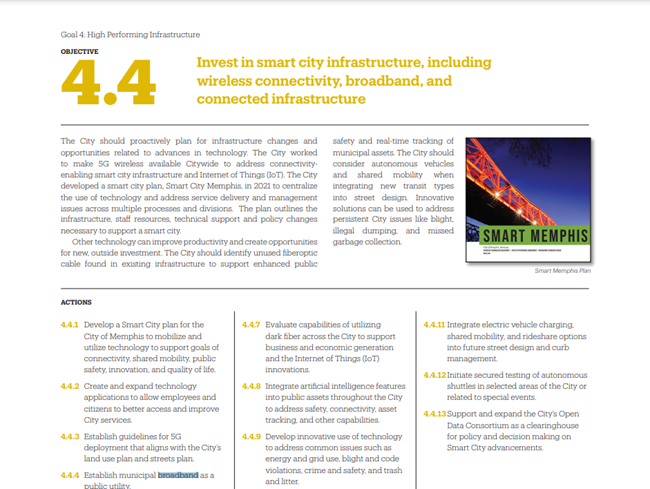
Memphis Mayor Jim Strickland has introduced an ambitious new plan to incentivize private telecom providers to deliver affordable fiber to 85 percent of the Tennessee city of 633,000. The project, part of the city’s Memphis 3.0 master plan, will spend more than $700 million to expand broadband in a city where less than a quarter of residents–most of them wealthy–have access to next-generation fiber.
On September 23, city leaders introduced a new city ordinance amendment establishing new, streamlined permitting and fee requirements. Their goal: to incentivize companies willing to expand fiber optic broadband to at least 60 percent of Memphis’ residential and business premises and 60 percent of all existing low-income premises.
Not long after, city leaders unveiled more details about their "Smart Memphis Fiber" effort. After issuing an RFP last year, Memphis officials say they’ve struck a partnership with Paris-based Meridiam and Blue Suede Network to build a $700 million fiber optic network with an eye on eventually reaching 85 percent of the total Memphis population.

“City Government will incentivize any interested company by reducing our costs through reductions in permitting fees and right-of-way fees,” Strickland said in a recent presentation before the city council. “Additionally, we will streamline our process to allow a company to get to work faster. We are also putting our own skin in the game.”
A project FAQ provides no details on a project deployment timeline or expected pricing, and neither Memphis nor Meridiam officials responded to a request for comment. Meridiam has struck similar partnerships with cities across Indiana, including Bloomington, Columbus, and Shelbyville.
The city says it will spend $15 million in American Rescue Plan Act (ARPA) funding and $7 million in Accelerate Memphis funds to help drive the project. That money will be used to manage dark fiber assets for City government use for 40 years, provide staff for implementation, and fund digital equity efforts aimed at further bridging the digital divide.
Unlike Chattanooga, which has seen notable praise for building out broadband as an extension of the city-owned utility (EPB), Memphis embraced the public-private partnership model (PPP). PPPs dramatically lower the cost of deployments for municipalities, but often leave cities with less control over the trajectory of the finished network–and broadband prices.
Memphis’ options were limited, in part, thanks to a state law lobbied for by AT&T that greatly restricts the ability of locals to build and operate their own broadband networks. Tennessee’s controversial and restrictive law also blocks the expansion of city-owned utility broadband networks outside of a utility’s core electrical service area.
Memphis won’t own the finished network, but they will be given dedicated access to 12 strands of fiber optic cable and 100 connection points. While potentially not as disruptive as a full municipal network, officials insist the partnership should have a dramatic impact on efforts to bring affordable access to long-marginalized neighborhoods.
“Memphis can become one of the most connected cities in America, where every Memphian can participate in our digital society and economic opportunity benefits us all,” said Mayor Strickland. “Expanding our broadband networks will immediately transform communities throughout Memphis and equip the City to make Memphis more efficient for generations to come.”
Limited Competition At The Hands Of Local Monopoly/Duopoly
In 2020, Memphis city leaders hired CTC Energy and Technology, an independent consulting firm to study broadband availability in Memphis, and help the city improve its telecommunications infrastructure and bridge the digital divide. Its findings were well in line with the broadband market failure seen in countless other U.S. towns and cities.

“Internet use in Memphis is high, but many lower-income Memphians purchase tiers of service below the FCC’s definition of ‘broadband,’” the report found. “These low-speed, asymmetrical connections limit Memphians’ ability to take full advantage of the economic, educational, and healthcare opportunities that depend on higher-speed connections.”
Like countless American communities, Memphis locals see a dearth of competitive options in a market dominated by Comcast Xfinity and AT&T. AT&T has long been under fire for not only failing to upgrade its aging DSL lines to fiber, but for taking a broad assortment of subsidies, tax breaks, and regulatory favors in exchange for next-gen networks that often don’t materialize.
The lack of competition in Memphis results in spotty coverage, slow speeds, poor customer service, and prices far higher than the average for developing nations. It’s a problem that routinely and disproportionately impacts low income, minority, and marginalized Americans.
Unsurprisingly, Memphis’ plan to disrupt this broken but profitable status quo isn’t being greeted warmly by local giants like Comcast, who are already voicing annoyance at Memphis’ plan despite having not bid on the proposal.
A 2018 Ookla report found that average broadband download speeds in Memphis are 44.86 megabits per second (Mbps) downstream and 12.96 Mbps upstream–putting the city in last place among the 100 cities ranked. And while five years later things have improved slightly, Memphis is still ranked 88th in city broadband speeds by the firm.
“Federal data suggests that at least 32,000 households do not subscribe to any internet services of any speed or technology, and local economic development planners estimate that more than 45 percent do not subscribe to broadband-speed wired services,” the Mayor’s office said. “Less than 25% of Memphis residents have access to best-in-class fiber internet.”

The reality on the ground is likely worse given the notorious unreliability of FCC broadband mapping data. For example, the FCC’s broadband maps for years have falsely claimed the majority of Memphis and Shelby County residents have the option of 4 to 12 different ISPs, despite most living under a fixed line duopoly or monopoly.
According to city surveys, nearly 90 percent of Memphis residents believe the city must help ensure that residents have access to affordable broadband, and 95 percent agree the city must help ensure students have access to affordable broadband.
Memphis’ efforts are only one part of a much broader effort to shore up connectivity gaps across Tennessee. Last July, Tennessee Governor Bill Lee announced in July the government would be funding $185 million in new broadband grants to expand access across the state, part of a larger $500 broadband budget made possible by the American Rescue Plan Act (ARPA).
Tennessee is also poised to receive more than $813 million in Broadband Equity And Deployment (BEAD) funding courtesy of 2021’s Infrastructure Investment and Jobs Act (IIJA). Some of that money may also wind its way to improvement efforts in Memphis.
“I am extremely excited about this project and what it will mean for Memphis and our citizens,” Strickland said of the city’s efforts. “By doing this, we will bring more competition to the market, and bring better, faster, and more reliable internet service to our community, especially to those who need it most.”
Header image courtesy of Flickr user Carl Wycoff, Attribution 2.0 Generic
inline image of “Memphis is Tennessee” wall painting courtesy of Wikimedia Commons, Attribution 3.0 Unported







